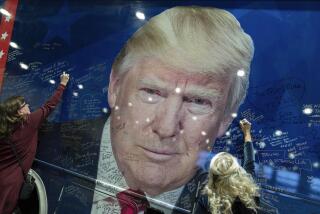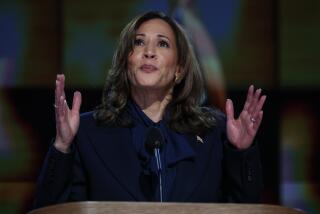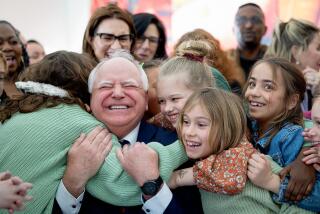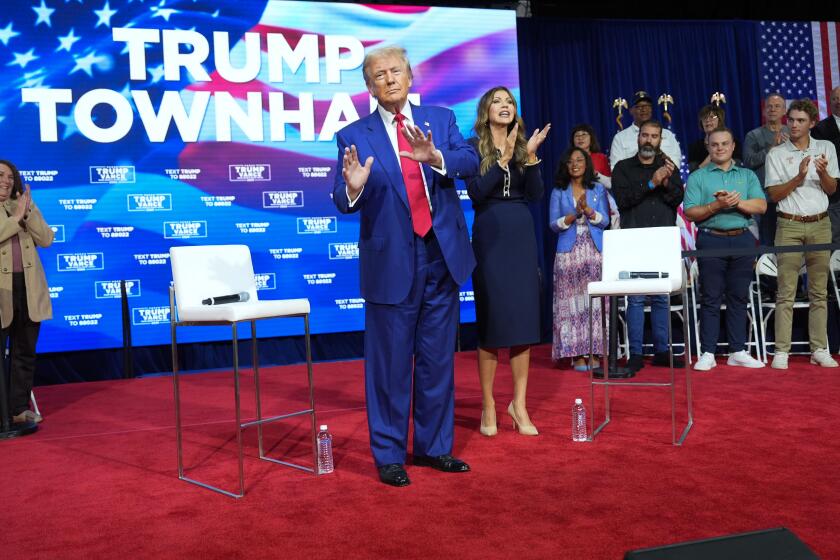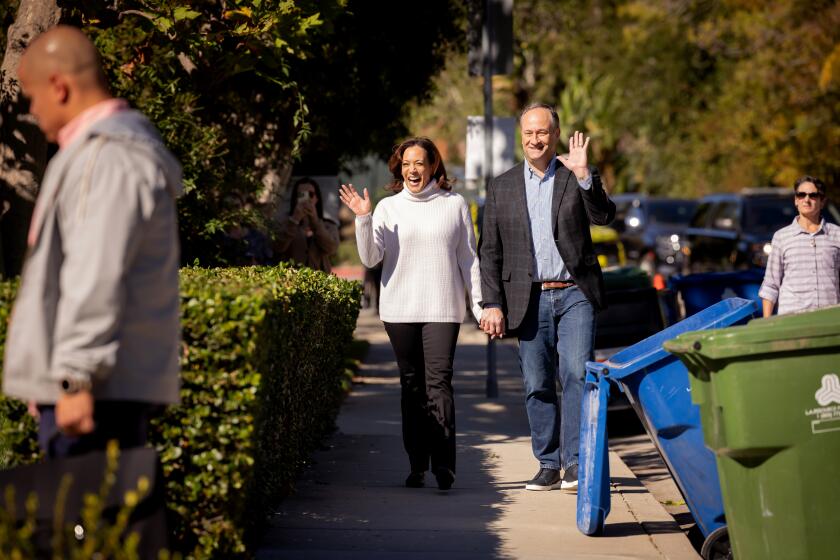Spotlight Seeks Real Bush, and It Casts Two Shadows : Profile: He hews to lofty goal of public service, but has no fear of the sometimes low road of election politics.
George Bush was in an exuberant mood in the days after his inauguration as vice president in January, 1981. As he welcomed visitors to his new office suite inside the Old Executive Office Building, he could hardly contain the thrill he felt at being there.
But when the conversation turned to his political future, Bush’s visitors were stunned to see his mood change so abruptly that he almost seemed to become a different man. The enthusiasm drained from his body and a serious, cold expression gripped his face.
“What are you planning to do for the next four years?” Bush was asked.
After a brief pause, he uttered a one-word answer: “Disappear.”
For a second, Bush’s visitors thought he was joking. But they quickly realized he was expressing a genuine determination to become politically invisible during Ronald Reagan’s tenure in the White House. He had decided to suppress any personal initiative that might prevent him from inheriting Reagan’s legacy when their terms ended.
For Bush, it was not the first time he would subvert his own will for a larger political goal--nor would it be the last. Those who have watched Bush’s 30-year career observe that he has frequently reinvented his political persona, his goals and ideas to win elections.
He was the pro-family-planning, pro-abortion-rights congressman--nicknamed Rubbers by one of his colleagues--who transformed himself into a staunch abortion foe. He was the New England preppy who became a pork-rind-chomping good ole boy. He was the Texas oilman who suddenly aspired to be the environmental President.
In fact, such flexibility and resilience have been among Bush’s primary strengths as a politician. Combined with his well known come-from-behind competitiveness, Bush’s ability to reshape his philosophy has enabled him to weather every unexpected roadblock he has encountered in his long and highly successful political career.
But therein lies what some analysts believe is the source of Bush’s current difficulties--perhaps the main reason he is having trouble responding to criticism from Democratic challenger Bill Clinton. Unlike any other time in his career, Bush now has a four-year record of achievements and failures as President that could prevent him from recasting himself in a different image.
“This time it has to be George Bush running as George Bush,” remarked a Republican political operative. “In that sense, this is George Bush’s first real candidacy. It is the first time he has been forced to run as himself and not as someone else.”
Essentially, that is the big difference between 1988 and 1992.
In 1988, Bush’s campaign manager, the late Lee Atwater, freely acknowledged that his strategy was to disguise the real George Bush by casting him as a clone of Ronald Reagan. In fact, in one private conversation with one of his political chums, Atwater used the very same word--”disappear”--to describe Bush’s tactics for winning the presidency.
In 1992, as President, Bush cannot disappear.
The real George Bush, close observers say, is actually two very different men: Bush the public servant and Bush the politician. “To Bush, the two are as different as the Civil War and Reconstruction,” authors Michael Duffy and Dan Goodgame wrote in their new book about Bush’s first term, titled “Marching in Place.”
Public service is what Bush sees as his true calling. The son of a U.S. senator, he was drawn to public life by the widely held view among members of his wealthy New England family that the privileged class has an obligation to serve.
Politics, in Bush’s view, is just a necessary evil that enables him to serve.
As a result, while Bush prefers to govern like a statesman, he has no qualms about doing whatever is necessary to get himself elected. Bush-watchers say he has approached every election of his life with the same determination that he expressed to interviewer David Frost last year when he said: “I will do what I have to do to be reelected.”
Because he makes a firm distinction in his mind between the high calling of public service and the low road of political campaigning, Bush has never seen it as deceptive or wrong to reinvent himself every time he runs for office. His long political history is a saga of many such twists and turns.
When he entered politics by running for Congress in 1964, Bush portrayed himself as a conservative. But that strategy brought him down to defeat on the coattails of GOP presidential nominee Barry Goldwater. So by the time he was elected to the House in 1966, he had transformed himself into a moderate who embraced the goals of the Great Society.
When he got to Congress, Bush called on his father’s political connections to get a seat on the House Ways and Means Committee. But he seemed to have no particular goal in mind. He was best known among his colleagues on Ways and Means for authoring legislation that aided the distribution of contraceptives, a cause dear to his father.
In 1970, Bush returned to conservative themes and ran for the Senate against Democrat Lloyd Bentsen. He lost.
Bush then enjoyed a decade-long hiatus from elective office, during which he served as U.S. ambassador to the United Nations, chairman of the Republican Party, envoy to China and director of the Central Intelligence Agency.
In 1980, Bush sought his party’s presidential nomination, even though Reagan was already considered the front-runner. It was during his unsuccessful effort to deprive Reagan of the nomination that Bush characterized Reagan’s proposed tax cut as “voodoo economics.”
But once he was chosen as Reagan’s running mate in 1980, Bush underwent another metamorphosis. He embraced Reagan’s opposition to abortion, except in cases of rape, incest and threats to mothers’ lives. On one occasion, he even denied that he had ever used the phrase “voodoo economics” in reference to Reagan.
Perhaps because he “disappeared” for eight years as Reagan’s vice president, Bush had a difficult time establishing himself as a viable candidate for the presidency in 1988. But he managed to achieve a come-from-behind victory by making a fantastic promise that he ultimately was unable to keep: “Read my lips: No new taxes.”
Considering Bush’s long history of successful political transformations, it is understandable that the public outcry over his 1990 agreement with the Democrats to raise taxes took him by surprise. He now acknowledges that it was the biggest mistake of his political career.
As many political analysts see it, the tax increase was the first time that Bush’s penchant for political reinvention caught up to him. Unlike “voodoo economics,” “no new taxes” was not a phrase he could later simply shrug off.
Indeed, it was a foretaste of what would happen again this year when, in response to criticism from Clinton, Bush sought to recast himself as an advocate of change. It was an unconvincing argument, given his record of stewardship over the status quo.
Now, as Bush prepares for a general election battle, his aides are lamenting that the President’s record is limiting his ability to respond to Clinton’s attacks.
“It is more difficult if you have a record to run on,” said Craig Fuller, a Bush loyalist who has worked with Bush on four national campaigns. “It can be a big help in some areas, but it’s tougher when you have a weak economy to be held accountable for.”
Another campaign adviser added: “It all comes down to credibility. And the fact is, when you’ve got 3 1/2 years around your neck, it’s a lot harder to reinvent yourself.”
Being President also has limited Bush’s ability to disguise his elite Eastern background, as he has done successfully in previous elections.
In 1964, he forswore button-down shirts and traveled with a country-western band, the Black Mountain Boys. During the 1988 campaign, he snacked on pork rinds and stopped making visits to his family vacation home in Kennebunkport, Me. This year, however, he has abandoned most of the down-home affectations and still visits his estate on the coast of Maine.
Likewise, being President makes negative campaigning much riskier for Bush.
In 1988, Bush met with a firestorm of criticism when he did not distance himself from ads that used the case of Willie Horton to attack his Democratic opponent, Michael S. Dukakis. Horton was a black convicted murderer who escaped while on furlough from a Massachusetts prison, then raped a white woman. Bush portrayed it as a law-and-order issue; critics saw it as a pitch with racial overtones.
The criticism has made Bush particularly sensitive to charges of negative campaigning, which he insists he will not do in his 1992 race. His advisers fear that if Bush gets too nasty in his attacks on Clinton, voters will regard it as unseemly behavior for the President of the United States.
But Bush has never been hesitant to use surrogates to do his dirty work. In fact, Atwater made such disparaging remarks about Dukakis in 1988 that later, as he lay dying of brain cancer, he felt moved to apologize to the former Massachusetts governor.
This year, the responsibility for the nastiest attacks has fallen to Republican Chairman Richard N. Bond and deputy campaign manager Mary Matalin, among others.
Nor has Bush been reluctant to send mixed signals to appeal to both sides on an issue. His critics say that he has often succeeded in presenting himself as a sympathizer with both sides of the civil rights debate, for example. Thus when his surrogates are criticized for attacking Clinton, Bush himself emphasizes that he is opposed to negative campaigning.
Being President also exacerbates Bush’s biggest weaknesses as a politician: his tongue-tied rhetorical style. In apparent deference to his office, he often tries to keep his true feelings under wraps. But eventually, his frustrations spill forth at odd moments with a disconcerting shrillness.
Arms flailing, he baffled voters at one rally earlier this year by proclaiming: “Don’t cry for me, Argentina.”
When all else fails, the one thing that Bush has always had whenever he has been involved in an uphill political battle is his own instinctive competitive spirit. Bush’s tennis partners say he is at his best when he is behind. When the odds are longest, the lanky southpaw with the awkward serve becomes a net-rushing demon.
“Throughout his political career a high percentage of George Bush’s opponents have dramatically underestimated him,” observed Rep. Jerry Lewis (R-Redlands). “Because of that, he catches people off guard.”
But in recent months, Bush has passed up a chance to strike with full force at Clinton during what many aides regarded as a crucial opportunity. It would not be appropriate, Bush decided, for the President of the United States to lock horns with his rival before the Democratic Convention.
As a result, his advisers are privately fearful that Bush might approach the last rounds of his final election campaign with the high-minded attitude of the public servant, instead of the fighting instinct of the politician.
“He really puts a lot of stock in the dignity of office,” one close Bush associate said. “That’s fine when you’re ahead in the polls. But when you’re 20 points down, you’ve got to come out swinging.”
For his part, however, Bush still has faith in his own come-from-behind magic.
“In politics,” he told his supporters at a Houston rally this week, “I’ve always done better when I fight back, when I’m behind. . . .”
More to Read
Get the L.A. Times Politics newsletter
Deeply reported insights into legislation, politics and policy from Sacramento, Washington and beyond. In your inbox three times per week.
You may occasionally receive promotional content from the Los Angeles Times.
